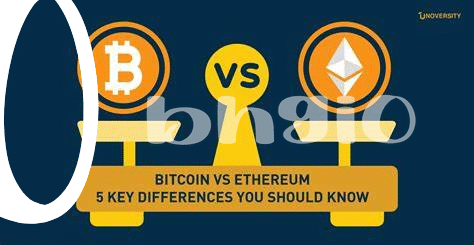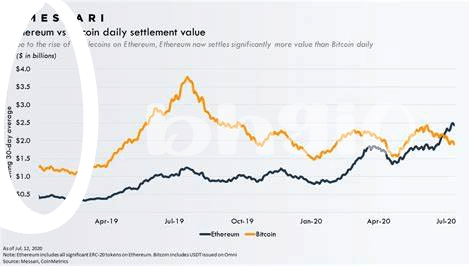🌍 Understanding the Basics: Ethereum Vs. Bitcoin

Imagine two giant digital piggy banks sitting in the vastness of the internet; one is named Ethereum and the other Bitcoin. These are not just any piggy banks; they are revolutionary ways of sending and saving digital money. Bitcoin, the first of its kind, is like digital gold – rare, valuable, and used by people worldwide to store wealth and make big purchases. Ethereum, on the other hand, is more like a giant world computer that not only holds money but can also run applications and contracts that work automatically.
| Ethereum | Bitcoin |
|---|---|
| Launched in 2015 | Launched in 2009 |
| Not just currency, but also runs apps | Primarily a digital currency |
| Uses ‘Ether’ for transactions | Uses ‘Bitcoins’ for transactions |
Both systems rely on a kind of magic book (blockchain) that records all transactions and ensures no one can cheat. They are the pioneers in allowing us to imagine a world where one can send money across the globe without needing banks in the middle, but they serve different purposes. So, when you hear about Ethereum and Bitcoin, think of them not as rivals, but as two different flavors of digital innovation, each with its unique strengths.
💸 Transaction Speeds: Ethereum Beats Bitcoin?
When we dive into the digital world, we find that speed really does matter, especially when it comes to making payments. Imagine sending money as easily as a text message, no waiting in lines, no waiting period, just zap, and it’s done. This is where the magic of Ethereum shines through. Unlike its older cousin Bitcoin, which feels like sending a letter through snail mail because of its longer transaction times, Ethereum is more like an email, quick and straightforward. Ethereum transactions typically take only a few minutes to complete, whereas Bitcoin could have you waiting for over 10 minutes or even longer when the network is busy. This speed difference is not just about saving time; it’s about efficiency and making the world of digital payments smoother and faster. For those looking to make small, quick payments, Ethereum appears to be stepping forward, waving its hand high, ready to make our digital transactions as swift as the morning breeze. So, in the race of speed, it seems Ethereum might just be edging ahead, ready to take the lead in our modern-day digital marathon.
🤑 Fees Showdown: Finding the Cheaper Option

When we talk about sending money digitally, no one likes paying more than they have to, right? Imagine you’re choosing between two cool options – one is a bit like an old but gold classic car (Bitcoin), and the other is more like a high-tech electric vehicle (Ethereum). Now, here’s the scoop on what you pay for a ride with each. Bitcoin, that classic ride, often asks for a higher fee. Why? It’s a bit like a super popular highway; more cars (transactions) mean more traffic and higher tolls. On the flip side, Ethereum might get you zooming on a slightly less crowded road, often costing you less to cruise through. But here’s a heads-up: prices on these digital highways can change fast – like, during a holiday rush. So, keeping an eye on these fees before hitting the gas is always a good idea. Between these two, finding the cheaper option really depends on when and how you decide to travel.
🔄 Flexibility in Payments: Ethereum’s Advantage

When we dive into the world of digital payments, thinking about how flexible they are can really make a difference, especially for smaller amounts. Imagine you’re at a local coffee shop, and you want to pay with digital currency. Here’s where Ethereum shines brighter than Bitcoin. Ethereum not only supports the traditional cryptocurrency transactions but also makes room for complex contracts and programs. This means businesses can create their own payment rules, like discounts for regular customers or special offers, directly in the transaction. It’s like having a super-smart wallet that not only pays but also knows when to grab a deal for you! Plus, with Ethereum, updates and new features are often easier to add, making it a forward-thinking choice for anyone looking to make or accept payments in creative ways. For those keen on exploring how digital currencies are revolutionizing the way we think about money beyond just the transaction, check out this insightful piece on empowering the unbanked with bitcoin: case studies versus ethereum. It’s a vivid world out there, and being able to adapt and transform makes Ethereum a go-to for innovators and visionaries looking ahead.
🔒 Security Matters: Who Wins the Race?
When it comes to keeping our digital money safe, both Ethereum and Bitcoin are like strong vaults, but they have their own ways of locking up. Imagine Bitcoin as a massive, super secure bank safe that’s incredibly tough to crack. It’s been around longer, proving its strength against many hacking attempts. On the other hand, Ethereum is like a high-tech safe with fancy features. It can not only hold money but also has special slots for contracts and agreements, making it a bit more complex. This complexity has its pros and cons when it comes to security. Sometimes, those added features can give hackers a little window to try and sneak in.
| Ethereum | Bitcoin |
|---|---|
| 🔒 High-tech safe with added features for contracts | 🔐 Super secure bank safe, time-tested against hacks |
| ⚖️ Balances flexibility and security, but complexity can be risky | 🏰 Offers a straightforward, robust protection; less complex |
So, who’s winning the security race? It’s a tough call. Bitcoin’s simplicity and proven track record make it incredibly reliable. However, Ethereum’s smart contracts add a layer of utility that, if managed carefully, doesn’t compromise on safety. The choice depends on what you need: a traditional, solid safe, or one with some extra bells and whistles.
🚀 Future Potential for Small Payments

Looking towards the horizon, the realm of digital currency shows a promising future for small transactions, especially when considering the evolution and advancements in the blockchain technology that underpins both Ethereum and Bitcoin. As we dance into the future, Ethereum seems to wear the brighter shoes for small payments, thanks to its inherent flexibility and the ongoing development of smart contracts, which could significantly lower costs and streamline processes. Meanwhile, Bitcoin, with its first-mover advantage and widespread recognition, is not stepping down anytime soon. Its role is evolving with evaluating bitcoin lending platforms and interest accounts versus Ethereum, showcasing a synergy with the DeFi ecosystem that could simplify and secure small payments in innovative ways.
However, the true potential of both platforms for small payments lies not only in their current capabilities but also in their adaptability to future technologies and economic models. Innovations like layer 2 solutions for Ethereum and the Lightning Network for Bitcoin are promising to make transactions almost instantaneous and cheaper than ever before. These advancements could radically transform how we think about small payments, making the use of cryptocurrency commonplace for everyday purchases. As both platforms continue to evolve, the winner in the race for the best small payment solution might just be the one that stays most in tune with the needs of its users, offering speed, security, and low fees in a fast-changing digital economy.
